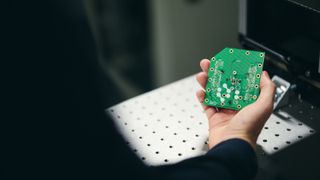British scientists say they have built the world’s most powerful computer – and it could be a “workable” computer by 2027.
The new chip uses an integrated control unit to control the state of the qubits and, unlike most chips, can be mass-produced using conventional semiconductor manufacturing techniques.
The key to the technology is how it works with quantum bits, or qubits, the fundamental units of information in quantum computing.
One way to control qubits in quantum computers is closed ion technology. This involves the isolation of atoms (ions) that have electricity in the electric field – called an ion trap – and use lasers so that they can better control their numbers. Doing so allows the ions to be manipulated and used as qubits to store and process quantum information.
Although trapped ion technology is useful for keeping qubits stable, it is neither dangerous nor practical due to the cost and complexity of laser technology.
Related: ‘Quantum-inspired’ laser computing is much more efficient than supercomputing and quantum computing, the basic principles.
But a new chip developed by Oxford Ionics eschews lasers entirely, using a patented “Electronic Qubit Control” system to control trapped ions. Because everything needed to control the qubits is integrated into the silicon, the new chip is reliable and easy to manufacture at scale, the scientists said. words.
In tests, the new chip delivered twice the performance of the previous record holder while using fewer than 10 qubits, the researchers said. The results were published on July 10 on the print server arXiv.

“When you build a supercomputer, performance is as important as size – increasing the number of qubits means nothing if it doesn’t produce accurate results,” said co-author of the study. Tom HartyCo-founder and CTO at Oxford Ionics, said in the statement.
“Now we have proven that our method has provided the highest performance in quantum computing to date, and it is now at the level needed to start commercializing quantum computing. This is a very exciting time for our team, and for our community. The positive impact that quantum computing will have. across the board.”
‘rocket ship approach’
For this lesson, Oxford Ionics microfabricated an ion trap measuring a few micrometers across, which forms the basis of his quantum chip.
The researchers measured the performance of the chip and the accuracy of what is known as security hospitals – a measure of proximity to a quantum gate (architecture of quantum circuitsequivalent to a logic gate in classical computing) corresponds to its logic function.
The scientists said their chip achieved single-gate fidelity of 99.9992% and two-qubit gates of 99.97% — the highest reported by any chip to date, they said — without the need for error correction.
“From the beginning, we have taken a ‘rocket ship’ approach – focusing on developing powerful technology to solve the initial challenges,” co-author of the study. Chris Ballanceco-founder and CEO at Oxford Ionics, said in a statement. “This has meant using the internet and smart technology to create a pure chaos that doesn’t need to be controlled to perform useful tasks, and now we can focus on commercializing our technology and providing useful computing at scale.”
Oxford Ionics will supply the chip design to the UK’s National Quantum Computing Center (NQCC) as part of its Quantum Computing Testbed programme.
In the statement, Michael Cuthbert, director of the NQCC, said: “We are excited to see how this will be used, and how we will use the advanced qubits to develop new algorithms and applications. .”
#Worlds #bestperforming #quantum #computing #chip #machines #scientists